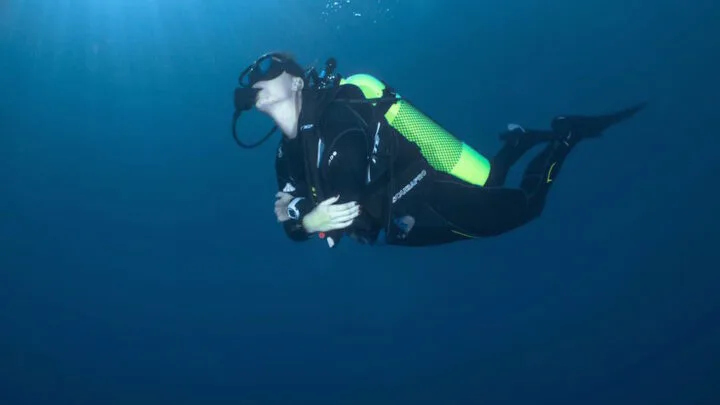Decompression illness is a serious subject and one here at Girls that Scuba we talk about often. While every case of DCS is different there are some similarities between women who have suffered from it, so we thought who better to talk to than the Girls that Scuba women themselves.
What is Decompression Sickness?
Decompression illness, or DCI/DCS, is a term used to describe an illness that results from a reduction in the ambient pressure surrounding a body. When you scuba dive with compressed air, you take in extra oxygen and nitrogen. Your body uses the oxygen, but the nitrogen is dissolved into your body tissues, where it remains during your dive. As you swim back toward the surface after a dive, the water pressure around you decreases. If this transition occurs too quickly, the nitrogen does not have time to clear from your tissues. Instead, it separates out of your blood and forms bubbles in your tissues or blood. It is these nitrogen bubbles that cause decompression sickness (the condition is called the bends). It occurs most commonly in scuba or deep-sea divers, although it also can occur during high-altitude or air travel.
What are the symptoms of DCS?
DCS symptoms are different from each individual but the most popular symptoms include:
- Joint pain
- Dizziness
- Headache
- Difficulty thinking clearly
- Extreme fatigue
- Tingling or numbness
- Weakness in arms or legs
- A skin rash
Is DCS related with the menstrual cycle?
So here’s where the difference between DCS in men and women comes in; the menstrual cycle. Many women have asked, and many have been TOLD, but what are the actual facts? Are we more at risk to DCS when we are on our periods? A study was taken back in 2003 to investigate the presence of any relationship between the development of DCS in female divers, the phase of the menstrual cycle, and the use of the oral contraceptive pill (OCP). The results didn’t give a definite answer and instead suggested that the risk of DCS may be dependent on the phase of the menstrual cycle and that the distribution of risk differs between OCP and non-OCP users.
Then our buddies over at DAN said:
“DAN and the British Hyperbaric Association looked at the statistics for 956 female divers with DCI and found that 38% of the women were menstruating when the incident occurred. Of those women, 85% were taking oral contraceptives. Though the data is inconclusive, it suggests that female divers taking the pill have an increased chance of DCI, and DAN suggests oral contraceptive pill takers partake in more conservative dives during menstruation.”
So that’s a yes right? Wait…
Diving log data from the Naval Diving and Salvage Training Center (NDSTC), Panama City, FL, demonstrate that there is no increased risk of DCS among Navy female divers compared to their male counterparts. 28 female students were compared to their 487 male classmates on 878 air and helium-oxygen dives. None of the women experienced DCS while 8 men developed DCS symptoms.
So we are back to the beginning. There is no real evidence if our menstrual cycle makes us more at risk to DCS?
What we do know is during a women’s menstrual cycle our bodies are at their weakest and can also be dehydrated – which CAN be linked to DCS and means we should dive even more conservatively during these times.
The problem (?) with medicine of diving
Here’s the thing ladies, and maybe I’m getting a little too feminist on this but the dive tables we use (that calculate the nitrogen absorbed by the body) are based on the physique of male divers who have, on average, a lower percentage of body fat than women. Fatty tissues absorb nitrogen at a slower rate than other parts of the body, such as the lungs and abdominal organs, which means they off-gas nitrogen more slowly as well. While we can’t say if this increases a woman’s susceptibility to DCI, it does demonstrate how the medicine of diving has been primarily focused on men’s health and not recognised the difference in women’s bodies – and the changes that happen each month.
Conclusion: Are women more likely to get DCS?
So what is the conclusion? During all of our research and talking to some members of Girls that Scuba about their experiences of DCS, unfortunately, there still isn’t a clear yes or no answer. However, what is clear is that women’s bodies are at their weakest during their menstrual cycle and women should take even more care scuba diving during this time.

